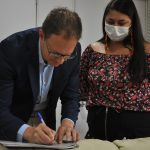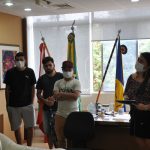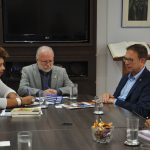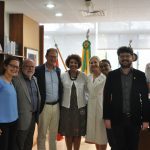Capes evaluation confirms UFSC’s excellence in graduate studies
The Brazilian Coordination for the Improvement of Higher Education Personnel (CAPES) has released the final results of the Quadrennial Evaluation (2017-2020) of 4,512 graduate programs in Brazil, whose preliminary results were released in September. The Universidade Federal de Santa Catarina (UFSC) has improved in performance: according to the official result, the university now has 27 programs graded 6 or 7 (maximum grade is 7), representing 40% of its programs and a growth of 35% in relation to the last evaluation.
The Graduate Programs in Electrical Engineering, Food Engineering, Knowledge Engineering and Management, Philosophy and Physical Education achieved grade 7, joining the Chemical Engineering, Chemistry, and Materials Science and Engineering programs, which already had this grade. The Graduate Programs in Biochemistry, Civil Engineering, Collective Health, Design, Neurosciences, Production Engineering, and Social Anthropology also achieved excellence. They obtained grade 6, joining the Graduate Programs in Aquaculture, Automation and Systems Engineering, Environmental Engineering, Food Science, Law, Linguistics, Mechanical Engineering, Nursing, Pharmacology, Plant Genetic Resources, Science and Technology Education, and Translation Studies, which obtained this grade in 2017.
Of the 67 academic programs evaluated at UFSC, 42 maintained the grades obtained in the last evaluation, 22 obtained higher grades compared to 2017 and 3 were assessed for the first time. It is worth mentioning that no academic programs at UFSC had a grade drop or were disqualified by CAPES in the current evaluation. The University has other 22 programs graded 5 and 11 programs graded 4. Only seven programs were graded 3, and three programs (Geology, Nanoscience, Processes and Advanced Materials, and Textile Engineering) were evaluated for the first time, as they were created in the past few years.
The Capes Quadrennial Evaluation takes into account quantitative and qualitative aspects of Graduate Programs in terms of faculty, student education, scientific production, and infrastructure, assigning grades from 1 to 7, where 3 is the minimum grade for a program to operate. Grades 6 and 7 place Programs at the level of academic excellence.
The Prorector for Graduate Studies at UFSC, Professor Werner Kraus Junior, highlighted the growth in the number of programs graded 6 and 7, taking into account that 12 programs have obtained higher grades than in the last evaluation. According to him, the results confirm UFSC’s academic excellence, which is already demonstrated by other indicators, placing UFSC in the sixth position among Brazilian universities in terms of number of excellence graduate programs. “Although Capes evaluates graduate programs only, the close relationship of this evaluation with the quality of undergraduate studies, research, outreach and management at the University is undeniable. The growth of graduate studies at UFSC in a period when major challenges were faced, such as the pandemic and the budget cuts for science and education, reflects the dedication and talent of the people who work and study here. It is, therefore, an achievement of the entire University Community”.
Translated by SINTER/UFSC.
Read the original article here.





 The Universidade Federal de Santa Catarina is studying partnerships in specialized areas with seven universities, three from Japan and four from Singapore. The networking began during an international mission that lasted 15 days and ended on 26 November. The Prorector for Research and Innovation, Jacques Mick, was part of the group led by the Support Foundation for Research and Innovation of the State of Santa Catarina (Fapesc) and by the Santa Catarina Association of Educational Foundations (Acafe). The visit was sponsored by the Santa Catarina government, interested in expanding the mechanisms of cooperation between the state, universities, and the private sector to promote development.
The Universidade Federal de Santa Catarina is studying partnerships in specialized areas with seven universities, three from Japan and four from Singapore. The networking began during an international mission that lasted 15 days and ended on 26 November. The Prorector for Research and Innovation, Jacques Mick, was part of the group led by the Support Foundation for Research and Innovation of the State of Santa Catarina (Fapesc) and by the Santa Catarina Association of Educational Foundations (Acafe). The visit was sponsored by the Santa Catarina government, interested in expanding the mechanisms of cooperation between the state, universities, and the private sector to promote development. On 5 December, members of the Central Administration had a meeting with the Consul General at the U.S. Consulate General in Porto Alegre, Shane Christensen, and the Cultural Attaché, Beata Angelica, at the Rector´s Office. The meeting aimed at discussing the resource feasibility for the implementation of the indigenous student residence project at the Universidade Federal de Santa Catarina (UFSC), Florianópolis Campus.
On 5 December, members of the Central Administration had a meeting with the Consul General at the U.S. Consulate General in Porto Alegre, Shane Christensen, and the Cultural Attaché, Beata Angelica, at the Rector´s Office. The meeting aimed at discussing the resource feasibility for the implementation of the indigenous student residence project at the Universidade Federal de Santa Catarina (UFSC), Florianópolis Campus.



